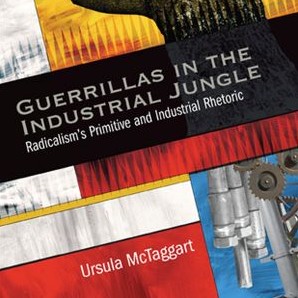 Book Review: Guerillas in the Industrial Jungle: Radicalism’s Primitive and Industrial Rhetoric
Book Review: Guerillas in the Industrial Jungle: Radicalism’s Primitive and Industrial Rhetoric
Author: Ursula McTaggart
Publisher: SUNY Press – 247 pages
Book Review by: Paiso Jamakar
This book on political activists in the United States written by Ursula McTaggart, an assistant
professor of English at Wilmington College in Ohio, takes a look at leftists, radicals, socialists
and other advocates for change, their organizations and their missions.
In four chapters, the author discusses respectively: the history of the Black Panthers (BPP)
and “how they lost their spots”; the differences between itself and the Panthers that the leaders
of the League of Revolutionary Black Workers (LRBW) pointed out; the project of socialists to
organize workers into labor unions in manufacturing; and the story of urban ‘hunter gatherers,’
and a discussion of ‘anarchism and the new primitive’.
Besides these two major radical organizations (BPP and LRBW), the author also discusses the
positions and work of: the Black Arts Movement, Communist International, the Communist
Party, the Communist Party USA, the Communications Workers of America, the Dodge
Revolutionary Union Movement (DRUM), International Socialists (US), International Socialist
Organization (ISO), Lowndes County Freedom Organization, Students for a Democratic Society,
Student Nonviolent Coordinating Committee, the Socialist Party, the Socialist Workers Party,
Telephone Traffic Union, and the United Auto Workers.
To get material for this book, among the people Ms. McTaggart interviewed were: General
Baker, Diane Feeley, David Finkel, Milton Fisk, Elissa Karg, Paul Le Blanc, Debby Pope, Kate
Stacy, Frank Thompson and Wendy Thompson.
The radical organizations covered in this work range from the ‘anarcho primitivists’ who,
writes the author, ‘believe that civilization is essentially doomed’ to members of the socialist
organization Solidarity who want to bring about revolutionary change in industry, in the form
of ‘radical union democracy’ that would give real power to the working class.
McTaggart comments about such dreams of these socialists: “Even in the post Cold War era,
when information technology dominates the social landscape and American manufacturing
continues to migrate abroad, socialists see the factory as the site of resistance. In a socialist
future, industry will provide for all.” (This is what socialists believe).
Leftists and radicals use the terms ‘primitive’ and ‘industrial’ as metaphors and ideological
concepts, and as notions of a better world, the author points out. She writes: “They suggest that
we are living in a state of either progress – which will lead to socialism, or degeneration, which
requires that we return to the past for our solutions.”
This book is a good study of political activism, particularly of leftists, radicals and socialists,
from the BPP and the LRBW in the 1960s to the International Socialists and the Socialist
Workers party in the 1970s, to the present. She looks at the imagery and rhetoric used by the
organizations and compares them with that found in African-American literature from the same
time periods. She also compares the political messages of organizations active in the 1980s, 1990
and 2000s with the language found in literary works of those periods.







